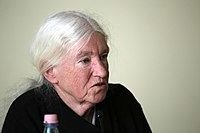To the Symposium Collective Memory-Work in Maynooth, Ireland, one of the many countries riddled by diverse crises.

Dear friends,
I greatly welcome the Symposium at this point in time as a forum for reciprocal exchange, information, and for the further development of Collective Memory-Work.
But one could object straight away: At a time haunted by wars, the entire political field being in crisis, and what’s more such a catastrophic environmental and ecological crisis not only concerning the conditions of human life but the existence of life on earth in general, it is totally impossible to turn individualistically towards the inner self and to think about Collective Memory-Work and its further development.
Let us turn around the objection: In a state of growing uncertainty, is it not all the more pressing to maintain and indeed expand the capacity to act of the individuals, so that they don’t need to give way to despair, get sick or try to save themselves by choosing ways that lead to their even deeper entanglement, that are harmful to themselves and exactly for this reason stand in the way of collective action?
Then, how about the suggestion to live in the present only, try to find rescue in oblivion, rid oneself of responsibility, and escape? Detachment from history is a big danger in itself, a warning sign.
Collective Memory-Work is an extensive work of gaining back, and appropriating history by following the traces of becoming this particular person. This is done by way of experiencing one’s own complicity in the process of societalisation as a praxis that happens always together with others. Hence changes to this praxis are similarly possible and necessary only collectively.
For some Collective Memory-Work may appear to be a lofty analysis of language. Yet, language is the way for us as human beings to master our lives, to understand and change to the better. It is a tool like other tools, it developed historically just as we did, it can be employed by different forces. To simply use language as if it would carry no weight means to be blind, or even to make oneself blind for understanding the power that is inherent to language, and not to use the key that opens the doors. It means instead to give it to those who are interested in dumbing down the people as a guarantee for obedience, subalternity and non-resistance against domination. Thus it becomes a weapon against emancipation of the individual as much as the collective of humans.
Just as everyone needs to work for the appropriation of the social for a better life for all, and thus for themselves, everyone also takes part in strengthening the barriers that safeguard domination, deaf to injustices, blind to alternative ways for gaining insights collectively, mute and thus incapable to speak the truth out loud.
Collective Memory-Work can help to understand one’s own involvement in history, one’s own complicity. Together it is possible to strengthen the forces of resistance and find alternative pathways, because the individuals are not only involved in repressive relations that are damaging to themselves, they similarly have at their disposal the resources to find common possibilities for alternatives and to commit to them. In the long historic process and struggles for the realisation of the potential of truly human life in which they take part they have acquired experiences, abilities, knowledges, consciousness, thought and emotion, attitudes and power, all of which want to be recognised, regained and appropriated collectively.
In midst of the horrendous global capitalism – with the revolutionising of the productive forces of labour – they need to appropriate their history for not to leave the digitalisation of the entire mode of living and working with its possibility and reality of connecting people worldwide to the destructive forces of a capitalism without any regard for human life and nature in general.
Frigga Haug, Los Quemados, January 2020